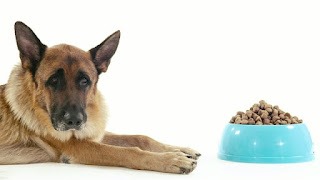German Shepherd food
German Shepherd food is crucial for their development. German Shepherds grow into a large breed weighing between 30 and 50 kilograms (66 and 110 pounds) that is well-muscled, slightly tapered, and hardworking when fed a breed-appropriate diet.

Adult German Shepherds need 1,300 to 1,600 calories per day of high-quality dog food for senior or less active dogs, and 1,700 to 2,400 calories per day for active or working dogs. In this blog post, we'll tell you everything you need to know about finding the right food for your German Shepherd.
Nutritional values German Shepherd food
If you choose a dry kibble diet for your German Shepherd, choose a quality formula with a protein content of around 24% and a fat content of around 14%. Shepherds require quality protein, which should come from a specified meat source.
Grain-free kibble is also an option, but it is very high in calories and protein. This should be approached with caution, as some German Shepherds seem to have difficulty tolerating grain-free kibble and end up with soft, runny stools. For excellent insight into choosing a quality kibble for your German Shepherd.
Help prevent bloating
Like many large breeds, German Shepherds are particularly at risk for bloating (gastric dilation-volvulus) after eating German Shepherd food.
While scientific data hasn't established a specific link between what we feed German Shepherds and bloating, it's generally agreed that grains and grain-based foods can contribute to the condition.
Specifically, inexpensive commercial kibbles loaded with carbohydrates and formulated with grains like corn, wheat, oats, and rice can cause excessive gas in the dog's stomach, which can lead to bloating.
Grain-free kibble uses alternative plant-based protein and carbohydrate sources like sweet potatoes, beans, and lentils and is therefore theoretically safer if you can find a food formula that's right for your German Shepherd.
Food for the active German Shepherd?
Carbohydrate and fat levels in high-quality German Shepherd foods are less important for active shepherds, but low-carb diets should be fed to dogs who are overweight, inactive, elderly, or have arthritis to keep them lighter on their feet.
German Shepherds, like many active large breed dogs, benefit from a diet that includes supplements that provide additional assurance for their overall health and well-being.
Omega-3 helps control inflammation, reduce arthritis pain, improve mood, increase trainability, and is good for the heart and kidneys. Omega-3 fatty acids in German Shepherd foods promote healthy skin and a shiny coat and help dogs fight infections.
Amount of food German Shepherd
Adjust the amount of kibble as needed based on your German Shepherd's size, weight, age, and daily activity level.
If you're feeding high-calorie, high-protein, grain-free kibble like Origen, you'll need to feed your German Shepherd slightly less kibble.
German Shepherd Puppy Food
German Shepherd puppies grow rapidly during the first six to eight months. For large breed puppies prone to bone growth problems, such as hip dysplasia, feeding a quality all-life-stage diet, large breed puppy food, or raw dog food is the best way to regulate growth.
You should not feed a German Shepherd puppy, or a large breed puppy, kibble designed for medium or small breed puppies. Most puppy kibble is high in calories, carbohydrates, and has a high calcium content to help "non-large breed" dogs reach adult size within six months.
Shop for kibble specifically formulated for large breed German Shepherd puppies, or quality formulated all-life-stage dog food, such as the brands we recommend here. It's important to let our German Shepherds grow slowly to preven.
%20(1).jpg)
.jpg)


.jpg)
%20(1).jpg)
.jpg)

No comments:
Post a Comment